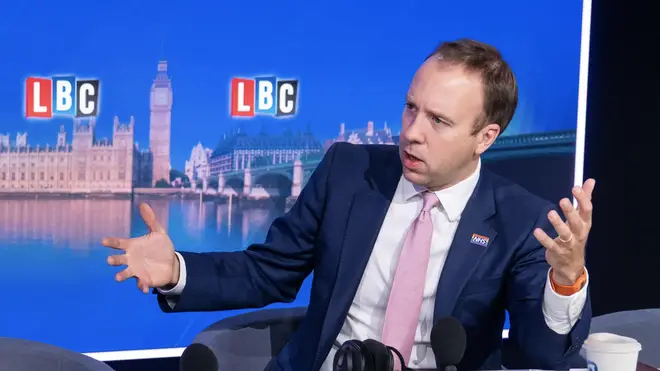
Ben Kentish 7am - 10am
7 September 2020, 13:26 | Updated: 11 September 2020, 12:46

A "vast majority" of workplaces are now secure from coronavirus, Matt Hancock has said in a message encouraging people to return to the office.
Speaking on LBC's new phone-in programme Call the Cabinet, the health secretary said he would "back people going back to work" on Monday as it would be "absolutely" the thing to do if an employer asks as much.
He said: "The vast majority of places are COVID-secure. That's a discussion you should have with your employer.
"We back people going back to work. It is safe to go back to COVID-secure workplaces."
READ MORE: Train services to increase to 90% of pre-coronavirus levels today
Mr Hancock also assured that work was still underway to refine and expand testing capacities that could eventually result in people taking a coronavirus swab at the start of the day to give them an all-clear for a day at work.
This, he said, was "the hope we hold for the nation" while a vaccine is still in development as it would allow people to carry out activities in close confinement.
He told LBC's Nick Ferrari: "You can imagine going to something, whether it's the theatre, or a sports event, or to work, and you have the test - and within, maybe, under an hour, you get the result back.
"If everybody's negative, they can go in. That's what we're working on."
READ MORE: Hancock warns over young people spreading Covid-19

Matt Hancock urges people to go back to work
The comments come as schools reopened across England and Wales on Monday and workers returned to the office after months-long breaks due to the pandemic.
Train services were also set to increase to around 90% of pre-coronavirus levels today, according to industry body the Rail Delivery Group (RDG), particularly at peak hours.
LNER, for example, is planning to ramp up to 85% of its pre-pandemic timetable, while Southeastern will be up to 98% of its usual services.

Hancock hopes fast testing will help open theatres and sports venues
But Mr Hancock suggested that while things wouldn't be completely back to normal without a vaccine against COVID-19, the research around testing could bring about a semblance of that.
He said the "holy grail" would be a pregnancy-style test that could allow people to swab themselves at the start of their morning routines and find out 30 minutes later whether they are infectious.
"You get to that position and that would transform how we can act as a society short of the vaccine," Mr Hancock stressed.
READ MORE: UK coronavirus cases soar by almost 3,000 in highest rise since May
There were 2,988 cases of the virus confirmed in the 24 hours leading up to Sunday afternoon, marking the highest daily rise since May.
This was almost double the number recorded the day before with 1,813 new infections.
Another two deaths were also reported, bringing the UK's total to 41,551.
A further 124 people were admitted to hospital.
READ MORE: Matt Hancock hopeful Covid-19 vaccine will be available next year
According to Mr Hancock, this surge in cases - which is also being seen across wider Europe - could primarily be traced back to more affluent younger people who have not been adhering to social distancing rules.
He said: "People must follow the social distancing rules. We see cases where [people] are not.
"The rise in cases is largely among younger people, under 25s, especially between 17 and 21.
"The message is that even though you are at lower risk of dying of COVID if you are of that age, you can still have really serious symptoms and consequences.
"Also you can infect other people.
"Inevitably it leads to older people catching it from them [the young]. Spreading the disease amongst young people leads to older people getting it."